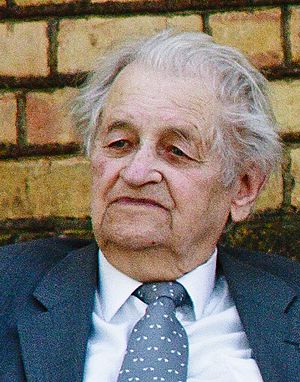Zigmas Zinkevičius facts for kids
Quick facts for kids
Zigmas Zinkevičius
|
|
|---|---|
 |
|
| Born | January 4, 1925 Juodausiai, Lithuania
|
| Died | February 20, 2018 (aged 93) |
| Nationality | Lithuanian |
| Occupation |
|
| Known for | Linguistics, Baltistics, Dialectology, history of the Lithuanian language history of the study of the Lithuanian language, the historical grammar of the Lithuanian language, onomastics, recreation of Proto-Baltic |
|
Notable work
|
History of the Lithuanian language (6 vols., published in 1984–1994) |
Zigmas Zinkevičius (born January 4, 1925 – died February 20, 2018) was a very important Lithuanian expert. He was a linguist, which means he studied languages. He was also a historian and a dialectologist, studying different ways people speak the same language. Later, he even became a politician. From 1996 to 1998, he served as the Minister of Education and Science of Lithuania.
Zinkevičius wrote many books and articles. One of his most famous works is the six-volume "History of the Lithuanian language," published between 1984 and 1994. He was a member of the Lithuanian Academy of Sciences, a group of top experts. He also worked with the Lithuanian Language Society and international magazines like "Baltistica." He taught at Vilnius University for 45 years. He could speak many languages, including English, German, Russian, and French.
About His Life
Zigmas Zinkevičius was born on January 4, 1925. His birthplace was a village called Juodausiai, located in the Ukmergė district of Lithuania. After finishing six years of school in his village, he went to a gymnasium (a type of high school) in Ukmergė in 1939.
In 1945, he began his studies at Vilnius University. He joined the Faculty of History and Philology. This is where he started his journey into studying languages and history.
A Life in Language Studies
Zinkevičius started his academic career in 1946. He worked as a chief laboratory assistant at Vilnius University. After he finished his own studies in 1950, he began teaching there. He also taught at the Vilnius Pedagogical Institute until 1956.
In 1955, he earned his first advanced degree. His thesis was about the history of certain adjectives in the Lithuanian language. From 1956 to 1967, he was a docent (a university lecturer) in the Lithuanian Language Department. He also served as the deputy dean of the Faculty of History and Philology for several years.
In 1967, he completed his doctoral thesis. This major work was about Lithuanian dialectology. It looked at the sounds and forms of different Lithuanian dialects. After this, he became a full professor in the Lithuanian Language Department. He led this department at Vilnius University from 1973 to 1988.
Later, from 1988 to 1991, he became the head of the Baltic Philology Department. After Lithuania became independent again, he also taught at Vytautas Magnus University. He was the director of the Lithuanian Language Institute from 1995 to 1996.
Zinkevičius was known as a very famous and hardworking linguist. He studied many topics related to the Lithuanian language. These included its history, how it developed, and the names of places and people. His work was highly respected both in Lithuania and in other countries. He was even chosen as a member of important academies in Sweden, Norway, and Latvia.
His Time in Politics
Zigmas Zinkevičius also took on a role in politics. He was the Minister of Education and Science of Lithuania. He held this position from December 1996 to March 1998. After that, he worked as a state consultant for education and science issues.
During his time as Minister, he focused on strengthening the Lithuanian language in schools. He believed that Lithuanian should be the main language used for teaching. He wanted to make sure that young people in all parts of Lithuania learned and used the national language.
After he passed away, Gediminas Vagnorius, who was the Prime Minister when Zinkevičius was a minister, spoke highly of him. Vagnorius said that Zinkevičius brought a "sincere, matter-of-fact, professional approach to education policy." He described him as "very sincere, very benevolent and distinguished by high intelligence."
In 1999, Zinkevičius was elected as the chairman of the Lithuanian Christian Democratic Party. He later resigned from this leadership role in 2000. This was because he disagreed with his party merging with another one. In 2001, he became a member of the new Lithuania's Christian Democracy Party.
Personal Life
Zigmas Zinkevičius was a Roman Catholic and practiced his faith throughout his life. He was married to Regina Zinkevičienė. They had two children together, a daughter named Laima Zinkevičiūtė and a son named Vytautas Zinkevičius.
Zigmas Zinkevičius passed away in a hospital on February 20, 2018. His family was with him during his final moments. He was buried on February 23 at the Antakalnis Cemetery in Vilnius.

